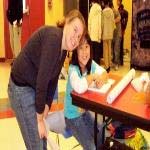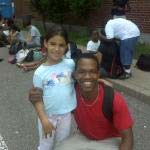
It's college graduation season in the United States. Even in today's weak economy, students from prestigious Ivy League universities like Harvard have an extra advantage on the road to financial success. However, not everyone in Harvard College's Class of 2010 is striving for a lucrative career.
Career choices
Graduation is just days away, and Robin Mount is even busier than usual.
The director of Harvard's Office of Career Services is matching her beloved students with the right employers and career opportunities, often in the fields of education, international development and public service.
"A lot of our students want to work in orphanages, micro-finance projects, AIDS [care] delivery 'on the ground,' global public health, I think all of those areas are problems that students are interested in solving," she says.
Graduating senior Wes Howe intended to become a mainstream journalist, but he became passionate about social justice while working as a reporter during summer break.
Passion inspires career path
Howe wrote a news article about a man who spent his savings on a house trailer that turned out to be defective. The circumstances pointed to criminal fraud by the seller, but the man had little recourse to get his money back. Howe was outraged, but felt that, as a newspaper reporter, there was little he could do about it.
"There is a point where exposing injustice wasn't enough," Howe says, "and actually working either toward changing either the law or bringing this to the attention of law enforcement was something that was interesting to me."
While at Harvard, Howe took advantage of the school's Center for Public Interest Careers. The counselors there got him an internship as an education advocate for New York City school children. After graduation, he will go to work in the Major Economic Crimes Division of the Manhattan District Attorney's office.
Another way to jump start a public service career at Harvard is with the Phillips Brooks House Association.
Public service jobs
The PBHA is an umbrella group for scores of community service and social action programs at the university. Its director Gene Corbin says the organization imparts a distinct philosophy to the 1600 or so students who volunteer regularly through PBHA every year.
"One of the things our organization preaches a lot is you 'do with,' you don't 'do for,'" he says. "You don't walk into a low income community and assume you have all the answers to their problems. There is rich knowledge and traditions in these communities, and you can learn a lot from those communities where you are serving."
Sociology major Jessica Ranucci worked with PBHA to smooth her path to a service career. She began volunteering at a community center for Vietnamese immigrants in nearby Dorchester, Massachusetts as a freshman. Later, she directed a summer camp for the community's children.
She admits that, as a naive 18 year old from the Indianapolis suburbs, she experienced some culture shock at first. The immigrants did too.
"I think that over four years of seeing the same children and families day after day...I've really been able to understand... what their lives are like. And I think they've gained an appreciation [of me] from my willingness to stick around," says Ranucci.
During his four years at college, Jarrell Lee has assumed many volunteer roles: tutor, mentor, camp counselor and later, director of the Boston Black Students Network, with members in over 40 area colleges and universities. He has travelled far from the impoverished African American neighborhood in Cleveland Ohio where he was born.

"When I graduate, I want to be teaching Americans at Excellence Boys Charter School in Brooklyn, New York. I am a black man. I know there aren't very many male teachers, number one, and not very many black teachers," says Lee. "So I know this is something I want to do, at least short term. And I really enjoy working with kids."
Statistics from Harvard's Office of Career Services do not show a trend among students away from lucrative careers in the private sectors and toward public service. However, one thing is clear: many of today's best and brightest are also committed to ensuring the well being of America's communities tomorrow.
For foreign students, top choice in US: USC
Higher education in US: what does it cost?
Some advice on choosing a college
經(jīng)濟(jì)危機(jī)時(shí)期入讀哈佛難上加難
(來(lái)源:VOA 編輯:陳丹妮)
